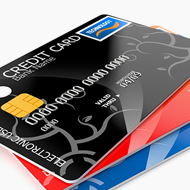What is the difference between credit and debit cards? How many should I have? How can I manage and/or reduce my credit card debt? These are all good questions, and understanding the answers can help you manage your budget and cash flow.
Both debit and credit cards are powerful financial tools that provide ease and convenience but are easy to misuse if you don’t understand how they function.
-
A bank account debit card provides immediate access to your checking account, drawing directly from your available funds. If you don’t have funds in your account to cover the expense, you may incur an overdraft charge and interest expenses if the bank considers the overdraft a loan.
- — If lost or stolen, many debit cards have loss limits up to $50 if you report the loss of the card within 2 days; however, it may take 5-10 business days for the funds to be replaced.1
-
Credit cards allow you to defer payment on purchases. This can be helpful when you are purchasing larger ticket items or in times when cash is tight. However, it is important to remember to budget for the repayment of the amount you charged.
- — If credit cards are lost or stolen, your loss is typically limited to $50.1 Consult your credit card agreement for specific loss limits on your credit cards.
How many cards should you have?
It is best to have two credit cards in your name, one for personal expenses and, if you have business expenses, one for business.
- Look for cards with low interest rates.
- Know the rules of the card, including such things as the fee structure and grace period.
- Choose reward cards carefully, especially if there is an annual fee or high interest rate associated with the card.
Managing your Credit Card Debt:
It is ideal to pay your credit card balance in full each month. If that is not possible, a basic rule of thumb is to pay at least 10% of the original balance each month. This way, you should be able to pay off the card within a year, assuming you don’t continue to add more charges to it.
Paying off your Debt:
There are a number of ways to get out of debt. Remember, you didn’t get into debt overnight, and you won’t get out of debt quickly. You need to develop and follow a plan. Here is one way:
- List all of your debt balances, interest rates, and minimum payments from the highest interest rate to the lowest.
- Pay extra on the highest rate loan and the minimum payment on the others.
- When one loan is paid off, put the payment for that loan toward the next highest loan, and so on, until all debt is paid.
This, of course, only works if you do not add new debt.
A balanced budget and careful tracking will help during this process. Be prepared to make tough choices about spending, or reducing your spending. If you find you cannot manage your debt, consider getting professional help from a reputable credit counseling non-profit. The Federal Trade Commission website provides information on choosing a credit counselor.
1 Federal Trade Commission Lost or Stolen Credit, ATM, and Debit Cards (August 2012).
